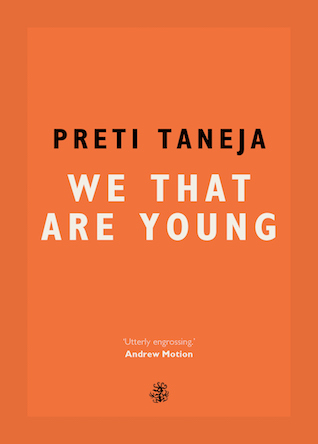You have no items in your cart. Want to get some nice things?
Go shoppingOften when I start a new book, especially a debut novel, I’m really excited for the first 50 to 100 pages. The first few chapters suck me in, and I’m so thrilled to have found a good read that it puts me in a great mood – at least until the book starts to flag, normally after the first few chapters. So forgive me for being jaded, and for assuming We that are young (Galley Beggar Press) was bound to follow that pattern – that the beauty of the writing would only be sustained for exactly the number of chapters needed to convince a lunch-time browser in a bookshop to buy, or seduce prospective agents and publishers. No way, I thought, could this compelling, vibrant prose be sustained for 550 pages.
We that are young, which recently won the Desmond Elliott Prize for New Fiction, is a retelling of the King Lear story set in India. It explores the corruption of corporate power, and tensions between traditional Indian values and contemporary India, with its “smell of sweat and traffic fumes deep-frying under the smog … dirt made from the breath of thousands of striving humans … college boys in their knock-off Nikes … college girls, Fab India block print kameez and jeans”.
It is told by the five main characters, whose narratives touch and overlap – half-brothers, Jeet and Jivan and their childhood friends, Gargi, Radha and Sita who are the three daughters of business tycoon, Devraj.
When Devraj decides to hand over control of his corporate empire to his daughters, the youngest, Sita – a human rights and climate-change activist – rejects her share and disappears. This sets Devraj on a destructive course, “playing the sprite, lighting pockets of chaos like flash fires”. Gargi is left to “keep the Company tickety-boo”, while “crowd-pleasing girl”, Radha takes care of public relations. Into all this has flown Jivan from his life in the US. “Half this, half that, always the other”, Jivan is an Indian American whose nostalgia for the country of his birth is tinged with constant disappointment in both the people and India that confront him, including his older half-brother Jeet.
Within each narrative appear interludes from Devraj – the Lear of the piece – which reveal his attitudes to women and social inferiors, as well as the darker aspects of his character. Devraj may absent himself from the main action early on but he remains a constant presence in the story, just as he is in his adult children’s lives.
We that are young is perfectly paced. It starts light and laugh-out-loud funny – although there is always a hint of uneasiness in the air – with Jivan’s arrival. Taneja writes vivid, atmospheric scenes in tight, clean prose with exquisite observational detail that isn’t afraid to tell it like it is. At the airport in Delhi:
“Emirates slaves hoist their bundles, middle-aged men carrying imitation Samsonites eye up the young bloods with leather weekend bags; there are the Juicy Couture wives, all don’t-touch-velour and overdone hair. Last come the whiteys, panicking politely as they try to keep some space between themselves and the natives without actually pushing anyone out of the way.”
The book throbs with underlying tension throughout – a tension that steadily builds with the growing resentment and inner turmoil of its characters, and finally erupts into Shakespearian tragedy.
But it’s not just the beautiful writing and literary skill that makes this book so remarkable. It is the size of the author’s vision. As a journalist and human-rights activist, Taneja has worked on the frontline of human tragedy – in Rwanda with survivors of the genocide and in Kenya with women in slums. She teaches creative writing in prisons and has campaigned for the rights of migrant workers. The book illustrates so perfectly how big power combines with the petty preoccupations of individuals to wreak havoc – and how the poor and less powerful among us exist at the mercy of that havoc – that I can’t help thinking Taneja’s work as an activist and journalist fed somehow fed into her vision.
Given that we’re living in such unpredictable times – the era of #fakenews and “alternative facts” – it is refreshing and reassuring to read a novel that is uninhibited in its truth-telling and still brilliantly entertaining on every single one of its 550 pages.

About Juno Baker
Juno Baker is a freelance writer, and editor of the University of Cambridge's Leading Change website. She has written articles for the Guardian and once interviewed Dolly Parton. Her fiction has been placed in several competitions – including Winchester Writers Festival, Pindrop, Short Fiction and Rubery – and was recently shortlisted for the VS Pritchett Short Story Prize. Her stories have also appeared in numerous magazines and anthologies, most recently, Mslexia, Unthology and Litro.
- Web |
- More Posts(13)





